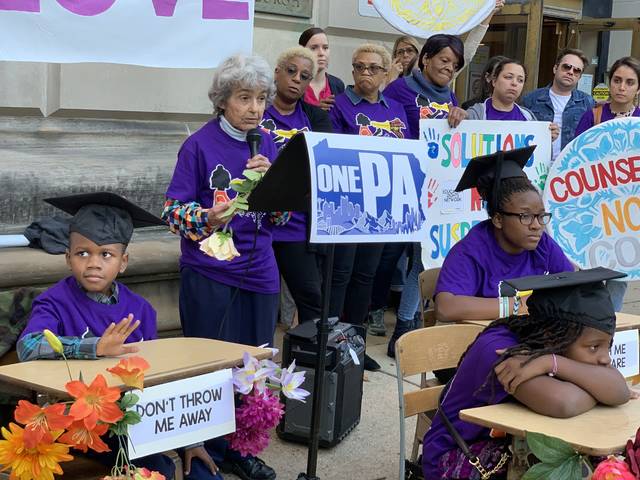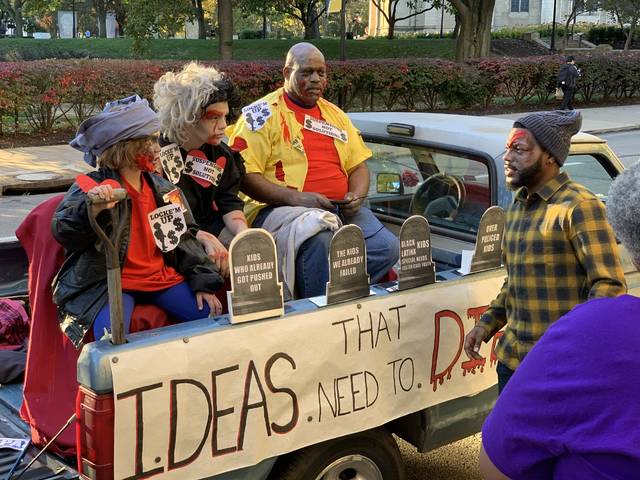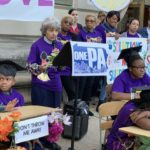Pittsburgh Public Schools should extend the district’s suspension ban for nonviolent offenses to apply to students in third through fifth grades, a group of education advocates said Monday night.
“We understand that suspensions don’t work, they don’t change the behavior, and kids are actually missing critical learning time by not being in the classroom,” said Angel Gober, Western Pennsylvania organizing director for One Pennsylvania, a statewide social justice advocacy organization.
Gober was among several speakers at a peaceful rally outside the district’s headquarters in Pittsburgh’s Oakland neighborhood before a non-voting school board meeting.
The group of activists, teachers, parents with young children and legal advocates held signs such as “Counseling not cops,” “Solutions, not suspensions,” and “Stop criminalizing kids.”
They called on the nine-member school board to do two things: expand the suspension ban, which currently is in place only for students in preschool through second grade; and listen to community input as the district negotiates an agreement with Pittsburgh police, its first such memorandum of understanding in nearly 10 years.
Children of rally participants sat at desks propped up on the sidewalk along Bellefield Avenue with signs that read, “Don’t throw me away,” “Teach me you care” and “I want to learn.”
Superintendent Anthony Hamlet and board members could not immediately be reached for comment.
Proponents of expanding the suspension ban pointed to research that links high numbers of missed school days to higher likelihoods of students struggling academically, dropping out of school and being referred to the juvenile justice system. They also expressed concerns over inequity, saying too many minority students get referred to the police or court system for minor offenses.
Last year, Pittsburgh Public Schools became the first of 500 district’s statewide to implement a ban on all nonviolent, minor infractions by K-2 students — offenses such as repeatedly showing up late, violating the school’s dress or cell phone policies or disrupting class.
At the time, principals and teachers expressed concerns about ensuring they have the necessary resources to provide alternative discipline options while still managing their classrooms effectively. The group of activists wants to ensure that schools and teachers get the tools and resources required to implement a suspension ban.
“Our kids are not getting what they deserve and what they need, and our teachers are not either,” said Kipp Dawson, a retired teacher who spent more than 20 years working in Pittsburgh Public Schools and Wilkinsburg.
Such resources could include creating “cool-down” or sensory rooms, peer counseling, racial bias training for teachers, yoga or gardening programs and increased efforts at “restorative justice” — an approach that encourages going past merely punitive measures and instead digging deeper to explore why a student is acting up and what may be happening in their home lives that’s contributing to inappropriate or unruly behaviors.
“There are many different options that are low cost,” Gober said.
Pittsburgh Public Schools joins districts nationwide in examining how to improve disciplinary practices.
Schools are increasing mental health services, expanding alternative education programs, updating their student conduct policies and exploring the effects of restorative justice practices, which focus on building relationships with students in an effort to come up with a resolution other than being removed from school.
A 2013 study conducted on behalf of the ACLU listed the Sto-Rox, Woodland Hills, Wilkinsburg, Pittsburgh Public, Aliquippa and Penn Hills school districts among the top 10 in the state with the highest suspension rates. It found that black students in Pennsylvania were five times more likely than white students to be suspended.
Early data suggests that the overall number of suspensions have declined since the district’s ban went into effect in fall 2018 — but the disproportionality of who gets suspended has not budged much and more data needs to be examined, according to Gober.
She said black students with special needs still get suspended at a far higher rate than any other students. Hispanic students and foster care youths also have disproportionately high suspension rates, she said.
Last spring, Pittsburgh Public Schools stopped forcing a 10- to 45-day suspension on students caught with less than 5 grams of marijuana. First-time offenders now have the option of a five-day suspension in exchange for meeting with counselors and taking weeknight or Saturday drug treatment courses.

















